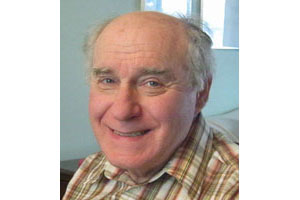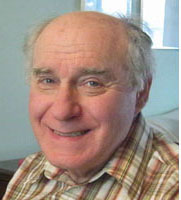Opinion
Lyndon Johnson: Holocaust hero

As many readers of The Jewish Post & News are likely aware, I maintain that President Donald Trump is the best friend that Israel and the Jewish people have ever had in the White House.
Despite the media’s constant labeling of him as an Anti-Semite (racist, etc., etc.) and hostility by a majority of American Jewry, his words and actions consistently say otherwise.
From frequent condemnation of anti-Semitism to having a “Jewishly” observant daughter and son-in-law, being the first president to have a sukkah in the White House, making it easier to prosecute anti-Semitism on American university campuses, moving the American embassy in Israel to Jerusalem, recognizing Israel’s annexation of the Golan Heights and generally having Israel’s back (unlike his immediate predecessor), Trump has shown a philo-semitism which long predates his time as president.
However, thanks to my friends Hillel Taylor and Merv Drabinsky, it has been brought to my attention that there is another former U.S. president whose record in terms of supporting Israel and the Jewish people is equally admirable. Unlikely as it may seem, that would be Lyndon Johnson.
Lyndon Johnson was a powerful congressional leader from east Texas who was chosen to be John F. Kennedy’s vice-president and who assumed the presidency following the latter’s assassination in 1963. As president, Johnson promoted his “Great Society” vision following up with the Kennedy Administration’s fight to end segregation. Johnson himself introduced sweeping new legislation aimed at reducing poverty in the States.
Unfortunately, his legacy was badly tarnished by the Vietnam War (based on poor advice from his generals) and he was driven from office after serving one full term.
What few people know though is Johnson’s lengthy and unswerving support for the Jewish people and Israel. In a report written in 2009 for the East Texas Historical Association, historian James Smallwood noted that Johnson’s interest in the national and international Jewish community “can be traced, in part, to his early religious upbringing, which included exposure to Christadelphian doctrines”.
Smallwood explained that Christadelphians believe that Jews and Israel have a special place in the grand scheme of things as the “People of the Book.” They further believe that Christ’s second coming would be signaled by a return of the Jews to Palestine and the recreation of the Jewish state of Israel and that they – the Chrtistadelphans – have a duty to help them fulfill the Bible’s prophecy.
“Although the mature LBJ did not become a Christadelphian,” Smallwood wrote, “he internalized his grandfather’s charge to “take care of the Jews, ‘God’s Chosen People.’ Consider them your friends and help them in every way you can.”
As early as 1934, Smallwood continued, the future Congressman recognized the danger that Hitler and Nazism posed to European Jewry. After the American government turned a “deaf ear” to the Jews in the late 1930s, Lyndon Johnson was among a small group of people who took action. He became part of a movement called Operation Texas.
Using his political clout, Johnson arranged for hundreds of signed immigration papers for distribution to German and Polish Jews. “Using methods, sometimes legal and sometimes illegal,” Smallwood wrote, “and using cash supplied by wealthy benefactors such as his Jewish friend, Jim Novy, Johnson smuggled hundreds of Jews into Texas, using Galveston as the entry port. Money bought false passports and visas in Cuba, Mexico, and other Latin American countries. As Johnson smuggled Jews into Texas, he gave them new names and hid them in the Texas National Youth Administration (NYA), a New Deal agency he had once headed in Texas. Johnson’s task was made easier because his long-time friend, Jesse Kellum, directed the NYA in Texas.”
By 1939, the historian added, with the position of European Jews becoming ever more precarious, Johnson met with Jewish leaders and expanded Operation Texas. Although it was illegal to harbor and train non-citizens in the NYA programs, Jewish refugees were housed at various sites scattered around Texas. Novy reimbursed the NYA for all expenses, including room-and-board for the trainees. He also covered the cost of classes for those who did not speak English and for vocational training so refugees could “blend” into American society.
Johnson channeled many men into NYA welding schools, since welders were in high demand during the war preparedness campaign of 1940-l94l, and then in the war itself. After Johnson was appointed to head the Navy’s shipbuilding personnel, he made sure that “his” refugees were hired. Other Jews that he aided worked in a strange assortment of jobs, including liquor stores, carnivals, and janitors in schools. Jim Novy’s son David estimated that Johnson and his father saved as many as four or five hundred Jews, possibly more.
Operation Texas, Smallwood added, also included aid to Jews already in Palestine who were “underground fighters.” In March 1942, Novy hosted a World War II bond drive party for thirty or so influential Texans and invited Johnson to make remarks. After they raised their quota for the bond drive, Johnson rose, gave his listeners some “straight talk” about the European and Middle Eastern situations, and then raised yet more cash – the new money ear-marked for the Palestine Jewish “underground.”
Smallwood noted that Operation Texas was a secret affair. It first became public on December 30, 1963, on the occasion of the dedication of Agudas Achim, the newest synagogue in Austin, Texas – at the time, the city’s newest synagogue. LBJ and his wife, Lady Bird, were in attendance, with the president scheduled to make remarks.
“Knowing that the new president was well beyond prosecution for his acts of long ago,” Smallwood wrote, “Jim Novy told the story to 400 synagogue members and their guests, along with Austin’s civic leaders and local newspaper, radio, and television reporters. After Novy finished his story, he introduced LBJ by looking over to him and – trying to hold back tears – said with a breaking voice: “We can’t ever thank him enough for all those Jews he got out of Germany during the days of Hitler.”
Over the years, Johnson – as a leader in Congress and President – helped out the State of Israel several times in times of need.
To conclude, Smallwood quoted a passage from the Houston Chronicle: “Johnson was a man who took considerable risk with his political career to uphold the message of racial, ethnic, and religious tolerance. Thus, many Jews have Johnson to thank for their lives because of his display of moral courage.”
Features
Did the Jewish Federation’s stepping in to force the firing of BB Camp co-executive director Jacob Brodovsky lead to the further alienating of many young Jews from the community?

(June 8, 2024) Introduction: We received the following email from a young Jewish Winnipegger re the BB Camp controversy, which we’ve reported on extensively on this website. We thought it important to post the email as a separate piece rather than as an add-on to an article in which we printed other emails from readers expressing their disappointment at what happened to Jacob Brodovsky, the former co-executive director of BB Camp:
Dear Mr. Bellan,
Thank you for once again cutting through the noise with your April 23rd column, “What the sordid BB Camp affair says about our community.” Your clarity and courage in calling out our rush to judgment and our narrowing definition of “Jewish identity” are deeply appreciated, especially by those of us who feel increasingly alienated in Winnipeg.
I also want to share a troubling observation about one of the loudest voices attacking Jacob Brodovsky: theJ.ca. Their articles—bylines like “Ron East” or “TheJ.ca Staff”—are, in fact, almost entirely generated by artificial intelligence. They contain no verifiable sourcing, frequently hallucinate details, and appear to be little more than a far-right newsletter running smear campaigns under the guise of “journalism.” The entire BB Camp series reads like an AI trained on extremist talking points, regurgitated daily to bully our community into silence.
As a young Jew in Winnipeg, I—and many of my peers—are horrified by the transformation we’re witnessing. What was once a warm, progressive community is now dominated by:
Bigots and Bullies: Parents threatening to pull their kids unless the camp bows to extremist demands.
Florida-style Republican Judaism: A narrow, intolerant ideology portrayed as the only “true” Jewishness.
Collapsing Leadership: Our Jewish Federation leaders, including Jeff Lieberman, have shown they lack the vision or backbone to navigate this crisis.
We stand at a dangerous inflection point. Our community is on the verge of a total and irreversible fascist takeover—an outcome no amount of regret or retrospective apologies can undo.
Please consider reading firsthand accounts from community members who have bravely spoken out:
I know this letter is anonymous and won’t be published, but I hope you see it as proof that many of us are desperate for ethical, forward-looking leadership. Thank you again for using your platform to remind us what Jewish community should mean: diversity of thought, compassion for all people, and the moral courage to call out extremism—no matter where it comes from.
This was NEVER a community of far-right Israelis. This is a shame beyond words.
With gratitude and urgency,
A Concerned Young Jew in Winnipeg
Post script: We had heard from many different sources (who all asked to remain anonymous) that the Jewish Federation’s decision to force the BB Camp board to fire Jacob Brodovsky came as a result of pressure from one or more big donors to the Combined Jewish Appeal. We sent an email to Jeff Lieberman, asking Jeff whether the Jewish Federation’s decision to force the resignation of Jacob Brodovsky as co-executive director of BB Camp came as a result of a donor (or donors) to the Combined Jewish Appeal threatening to withdraw their donation(s) this year unless Jacob were fired. I don’t think anyone would be surprised to learn that Jeff did not bother responding to my request for information.
The Jewish Federation used to advertise elections to its board in The Jewish Post & News for many years, but no longer does so (in the Jewish Post). Instead, it submits a slate of new appointees to its board to members of the current board to be rubber stamped. Is it any surprise that the donors who contribute the most money call the shots for the Federation (which is as its always been. The only difference is the Jewish Federation and the Winnipeg Jewish Community Council before it used to operate with a patina of democracy. Sadly, that is no longer the case.)
We would urge anyone on the Federation board who could give information about what led the board to force the resignation of Jacob Brodovsky to contact us. We would give full anonymity, as we have to the writer of the above letter.
-Bernie Bellan
Local News
Is It Alberta’s Turn to Regulate Online Gambling? Looking at the Possibilities

Online gambling and betting in Canada is booming, with each province allowed to regulate its own space. Ontario, Canada’s most populated province, turned two this year after leading the way in April 2022. In what should motivate Alberta and other provinces, Ontario is already reaping the rewards, generating $100 million annually in gambling revenue. Will the local administration in Alberta do what is needed?
Talks have been rife that Alberta is considering going the Ontario way by having an open-licensing system. In July 2023, the minister for Service Alberta and Red Tape Reduction, Dale Nally, issued a mandate to make this province a hub of online sports betting and gambling.
Alberta Premier Danielle Smith recently asked Nally to cooperate with indigenous partners and other stakeholders to develop an online gaming strategy. The main focus will be on revenue generation and responsible gambling. In light of this, Nally said Alberta’s primary focus is becoming a “leading hub for iGaming” with streamlined regulations and low corporate taxes. Such conditions should position Alberta to become a leading iGaming destination.
A few weeks ago, the minister attended the ICE international gaming conference held in London. Together with Ontario’s Attorney General, Doug Downey, and other stakeholders, Nally participated in a roundtable discussion regarding the status of iGaming in Canada. CDC Gaming Reports also revealed that the discussion highlighted the success of iGaming in Ontario and how Alberta can emulate this success story.
Looking into the Alberta Budget 2024, it’s evident that state monopoly could soon give way to Canadian casinos to thrive in the province. Alberta took the first baby steps towards a more liberal gambling sector after setting aside $1 million for gambling. This budget will support the looming review of the Gaming, Liquor, and Cannabis Act and supporting Regulation. The idea is to review the entire regulatory framework to find more funding ways for Alberta charities and community projects.
Major operators like BetMGM, PointsBet, and PokerStars have since hired lobbyists to ensure commercial operators become a reality in Alberta. Speaking to investors and industry analysts in March this year, PointsBet CEO Sam Swanell tipped Alberta and British Columbia to legalize online betting soon. He noted that this could provide the much-needed expansion of that TAM.
Alberta is yet to take full advantage of online gambling despite being the country’s fourth-largest province, with around 4.3 million people. Smaller markets in North America, such as West Virginia and Connecticut, are already benefiting from commercialized online gambling. The good news is that noises about legal online gambling are getting louder in Alberta. It’s just a matter of when the government will make the announcement.
What Next for Online Gambling and Betting in Alberta?
Including a $1 million gambling review budget is definitely a step in the right direction. However, there’s still much to do to end Alberta’s long-standing gambling status quo. But at least the budget opens the door for further discussions and reforms regarding iGaming in Alberta. That discussion has been underway, although the momentum has increased in the last year or so.
As it stands, PlayAlberta.ca is the only regulated online gaming platform in Alberta. It’s a government-run website operated by the AGLC (Alberta Gaming Liquor and Cannabis). Besides casino games, this website provides sports betting and lottery-style gaming experiences. The legal sign-up age on PlayAlberta.ca is 18 years.
For Albertans who prefer more gambling freedom, the government doesn’t restrict anyone from joining offshore operators. Most gaming sites operating in Alberta are licensed in Curacao, the UK, and Malta. Compared to PlayAlberta.ca, these websites provide a more extensive variety of games, rewards, and general experience.
In conclusion, it’s just a matter of when Alberta will introduce an open-licensing market. This approach has proved to be a success elsewhere, especially in Ontario. A recent Ipsos report in Ontario revealed that only 13.6% of the residents prefer to gamble on offshore websites. Alberta could soon follow this path, although there’s much work to do to realize this dream.
Opinion
Hamas savages make no distinction between Israeli Jews, Arabs

By MYRON LOVE I remember many years ago attending a presentation by Simon Wiesenthal, the world’s leading Nazi hunter, during which he made the point that the focus of Holocaust education should not be on the number six million – the number of estimated Jews who were murdered – but rather on the 12 million martyrs – including other targeted groups such as the Roma, people who were gay, the mentally and physically handicapped and the many great many Slavic people who were also murdered. After the Jews, the Slavs were next on the list.
By focusing strictly on Germans killing Jews, he observed, it became too easy to make it out to be only Germans versus Jews – thereby making it easier for Holocaust deniers and absolving the other European peoples who were complicit in the killings.
Similarly, while we naturally mourn our Jewish brethren who were so horribly slaughtered on October 7, we need to also bear in mind that Hamas made no distinction in its murderous rampage between Israeli Jews and Israeli Arabs or between Israelis and foreign workers.
In a posting for The Gatestone Institute on November 30, Israeli-Arab journalist Khaled Abu Toameh noted that he Hamas terrorists who attacked Israel on October 7 did not slaughter Jews alone. The terrorists also murdered and kidnapped scores of Muslim citizens of Israel, including members of the Bedouin community. The terrorists’ murder spree made zero distinction between young and old, Muslim and Jew.
“Scores of Arab Israelis were wounded, murdered or taken prisoner,” he reported.
One such brave individual was 23-year-old Awad Darawshe, an Arab-Israeli paramedic who was on duty at the music festival near Kibbutz Re’im, which was among the first locations under attack. When the medical staff on site were ordered to flee, he insisted on remaining behind to treat the wounded.
Abu Toameh suggests that the paramedic thought that because he was Arab, he could reason with the killers. He was murdered nonetheless.
Another courageous Arab-Israeli that the writer noted, 50-year-old Abed al-Rahman Alnasasrah, was murdered by Hamas terrorists when he attempted to rescue people from the music festival. He was married and a father of six children.
Fatima Altallaqat, 35, from the Bedouin village near Ofakim, was murdered while working with her husband near the city of Ofakim in southern Israel. She was a mother of nine children, the eldest nine years old.
Abu Toameh quotes her husband as saying: “We’re a religious Muslim family and she wore the traditional headdress of a devout woman. It is inconceivable they [Hamas terrorists] could not see who was inside [the car]. They were five meters away from her as they passed.”
Forty bullets were fired into her.
Abu Toameh further cites the comments of Suleiman Zayadneh, brother and uncle, respectively, to four of the Arab-Israeli hostages, who describes himself “as proud to be a Palestinian and Muslim”.
‘The people who came to shoot and kill — they know nothing of religion,” the writer quoted Zayadneh as saying. “These [Hamas] people came and killed left and right.”
Abu Toameh went on to reference the words of Nuseir Yassin, a video blogger with 65 million followers. Two days after the massacre, he wrote: “I realized that… to a terrorist invading Israel, all citizens are targets. More than 40 of them [the murdered] are Arabs. Killed by other Arabs. And I do not want to live under a Palestinian government. Which means I only have one home, even if I’m not Jewish: Israel…. So from today forward, I view myself as… Israeli first. Palestinian second. Sometimes it takes a shock like this to see so clearly.”
Abu Toameh reported that “there have been many storie about reciprocal inter-communal generosity and heroism in the aftermath of this national tragedy, and they create hope for the future”.
He quoted a statement by the Darwashe Family:
“We are very proud of Awad’s actions… This is what we would expect from him and what we expect from everyone in our family — to be human, to stay human and to die human.”
Abu Toameh also quoted Ali Alziadna, four of whose family members were kidnapped, as saying that he was “touched by the outpouring of support” by other Israelis.
“People from all over the country have come to hug and support our family,” Alziadna said. “The entire nation is one family now.”
Abu Toameh pointed out that many Arab citizens of Israel serve as IDF officers and policemen, risking their lives for their fellow Israelis. Many are serving at the front lines, saving lives.
Undoubtedly, Abu Toameh suggested, one of the objectives of the Hamas massacre, in addition to slaughtering as many Israelis as possible, was to thwart normalization between Israel and Arab countries, especially Saudi Arabia. Hamas may also have aimed to damage relations between Jews and Arabs inside Israel.
”The terror group was, without doubt, hoping that we would witness another cycle of violence between Jews and Arabs inside Israel, similar to that which erupted in May 2021,’ Abu Toameh posited. “Then, Hamas succeeded in inciting a large number of Arab citizens of Israel to take to the streets and attack their Jewish neighbors and Israeli police officers.
“This time, however, the Arab-Israelis have not heeded the calls by Hamas. One reason is that Arab-Israelis saw, with their own eyes, how Hamas terrorists make no distinction between Jews and Muslims.
“Hamas has repeatedly demonstrated that it cares nothing for the well-being of Arabs and Muslims. From their luxury homes and hotel rooms in the safety of Qatar and Turkey, Hamas leaders give the orders to attack Israel and then sit back and let the world weep over the destruction they wrought upon their own people.
“On October 7,” Abu Toameh concluded, “Hamas metaphorically shot itself in the foot by showing the world, with unfathomably ghoulish pride, by way of Go-Pro cameras and other self-documentation, that it has neither a religious nor a secular-humanist set of values. Perhaps the Palestinians in the Gaza Strip should look at the Arab citizens of Israel and note how they enjoy equal rights, democracy, freedom of speech and a free media. If Palestinians wish to live well, like the Arab-Israelis, this is the time for them to get rid of Hamas and all the terror leaders who, for seven decades, have brought them nothing but one disaster after another.”
It is too bad that so many gullible fools in our Western societies refuse to open their eyes to the truth.


